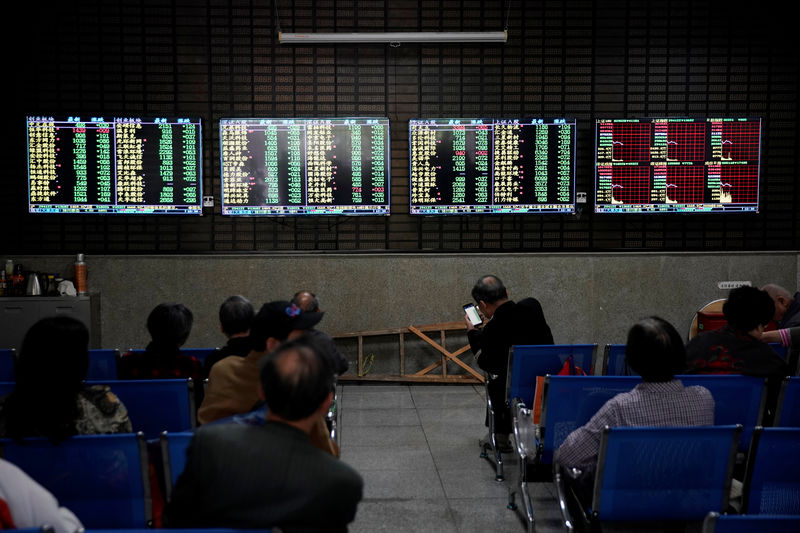This post was originally published on this site
https://i-invdn-com.akamaized.net/trkd-images/LYNXMPEFAP01N_L.jpg © Reuters. Investors look at screens showing stock information at a brokerage house in Shanghai
© Reuters. Investors look at screens showing stock information at a brokerage house in ShanghaiBy Stanley White
TOKYO (Reuters) – Asian stocks rose on Tuesday, bolstered by new momentum in Sino-U.S. efforts to end their acrimonious trade dispute and as Chinese e-commerce giant Alibaba made a strong Hong Kong debut in the world’s largest share sale this year.
MSCI’s broadest index of Asia-Pacific shares outside Japan () rose 0.4% to a one-week high. Australian shares () were up 0.83%, while Japan’s Nikkei stock index () rose 0.54%.
Shares in the region extended earlier gains after Beijing said Liu He, China’s Vice premier and chief trade negotiator, held a phone call with his U.S. counterparts and that both sides reached consensus on how to move forward in their dispute.
That followed positive headlines out of China and the United States on Monday, which had helped bolster confidence.
The yen fell to a two-week low versus the dollar, while the Swiss franc traded near a six-week low against the greenback as the optimistic tone sapped demand for safe-haven currencies.
“The broad trend is the markets are looking for a deal because trade has been the biggest factor weighing on global growth and holding back confidence,” said Shane Oliver, head of investment strategy and chief economist at AMP Capital Investors in Sydney.
“We have a low interest rate environment that is supportive of equities. If we get better economic news and relief from geopolitical risks, equities could rally further next year.”
U.S. stock futures () edged 0.08% higher in Asia on Tuesday after Wall Street’s three main stock averages closed at record highs on Monday, buoyed by hopes for a trade deal and by M&A activity.
The pan-region Euro Stoxx 50 futures () were up 0.03%, German DAX futures () were up 0.12%, while futures () were up 0.14% on Tuesday.
Traders pointed to China’s decision to increase punishments for intellectual property rights violations as a fresh concession to the United States in the drawn-out and volatile negotiations.
Investors were also encouraged by positive comments from U.S. President Donald Trump, Chinese President Xi Jinping and Chinese state-owned media about the chance for an imminent trade deal.
Also driving Wall Street higher was a burst of major acquisition activity with France’s LVMH (PA:) offer to buy U.S. jeweler Tiffany & Co (N:) and Charles Schwab Corp’s (N:) purchase of U.S. discount brokerage TD Ameritrade Holding Corp (O:).
In Hong Kong, shares of Alibaba (HK:) (N:) opened 6.9% higher than their issue price and at a small premium to pricing in New York. However, the Hang Seng index () fell 0.14%.
The Chinese firm has raised at least $11.3 billion from the secondary listing, which has been seen as a vote of confidence in Hong Kong after months of anti-government protests rocked the former British colony.
The United States has imposed tariffs on Chinese goods in a 16-month long dispute over trade practices that the U.S. government says are unfair. China has responded in kind with its own tariffs on U.S. goods.
If both sides cannot reach an agreement soon, the next important date to watch is Dec. 15, when Washington is scheduled to impose even more tariffs on Chinese goods.
In the offshore market, the yuan briefly rose to a one-week high of 7.0188 versus the dollar.
The yen fell to 109.205 per dollar, the lowest since Nov. 12, as safe-haven demand waned.
The Swiss franc , another safe-haven, traded at 0.9967 per dollar, close to the lowest since Oct. 16.
(), the world’s biggest cryptocurrency, rose 1.34% on Tuesday to $7,218.11, recovering from a six-month low on Monday after the People’s Bank of China (PBOC) launched a fresh crackdown on cryptocurrencies.
The PBOC is stepping up efforts to roll out its own digital currency, partly to fend off potential threats from Facebook’s proposed digital currency, Libra.
U.S. crude () was flat at $58.01 a barrel. Brent crude () rose 0.09% to $63.71 per barrel.


